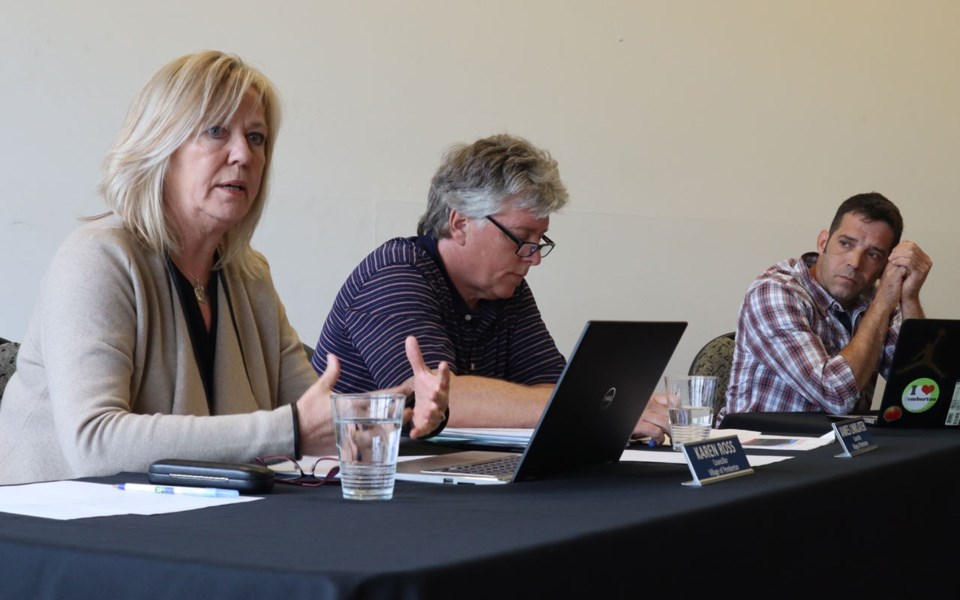Village of Pemberton (VOP) council voted not to proceed with a controversial proposal that would have seen its boundary extend over several areas of Electoral Area C, bringing in an additional 206 properties and two independent power producers.
After listening to a presentation by urban systems planner Dan Huang, VOP councillors unanimously chose not to support the extension.
"As has been said, the numbers don't add up," said Richman.
"We had to go through this process in order to understand that."
Had council chosen to support the extension, affected Area C residents would have voted on whether they wanted to be part of the Village during local elections on Oct. 20.
Since the Village sent out letters on the proposed boundary extension in April, it has generated significant opposition from Area C residents concerned that their taxes would rise without getting anything substantial in return.
The June 12 council meeting was held at the Pemberton & District Community Centre in order to accommodate the large crowd that came out for the boundary extension debate.
"I'm totally stoked council looked beyond just the tax revenue coming their way," said Area C resident Clemens Machilek.
"I'm not against the boundary extension. I'm totally onboard with making this (area) bigger, better, greener for everybody.
"But the current proposal wasn't quite worked out enough."
Machilek was part of a group of opposed Area C residents who spent two weekends gathering signatures against the proposal.
In total, the team of volunteers collected 205 signatures.
In a letter accompanying their petition, Dylan LaBelle wrote that the team spoke to "less than 10 residents that decided to abstain OR were in favour of the proposed VOP Expansion Plan" and decided to pause their efforts "due to overwhelming opposition" to the proposed boundary extension.
Council also received 39 feedback forms following two well-attended information sessions on the issue, with the vast majority of comments opposed to the extension.
The Village also received several letters.
Area C resident Ingrid Szoghy wrote that the boundary extension would not bring any tangible benefits and was out of line with the province's new NDP-led government's promise to make life more affordable in the province.
"It will not provide Area C residents with any benefits, and it may reduce the current services that the Village area residents are receiving (for example: snow clearing). I believe the majority of the residents in Area C are opposed to this expansion," wrote Szoghy, adding that in her estimation "80-90 per cent" of affected residents are opposed.
If the extension had come to pass, Area C residents would have seen their property taxes rise.
According to Huang's calculations, the boundary extension carried a potential tax impact of $577 for a $600,000 sample residential property and $544 for "a typical Class 9 farmhouse."
In his final report on the boundary extension, Huang acknowledged that the extension was geared more towards addressing issues of identity and representation than bringing additional services to Area C residents.
"Unlike many boundary extensions, which involve the provision of new services (e.g. water, sewer) to lands beyond the municipality, the main goals of this boundary extension (are) to address the current issues around community identity, representation, land use planning control, and existing service delivery," wrote Huang.
In total, the boundary expansion would have brought an additional potential annual net revenue of approximately $395,000 to the Village.
But with that would have come additional responsibility, including for 6.3 kilometres of roads in the boundary extension area.
During a May 15 open house where information about the boundary extension was presented to the public, Richman had said getting the province to bring the roads "up to standard" or agree to provide the Village with the funds to do so was critical to his support of the extension.
Huang's final report, however, revealed that the province wasn't willing to play ball.
"Although a detailed cost estimate for road capital upgrades in the boundary extension area is not part of the scope of this study, the potential financial impacts to the Village of Pemberton for future road capital upgrades are significant, and should therefore be considered carefully by the Village," wrote Huang.
For Richman, the lack of commitment by the province ended up being the nail in the coffin.
"We've gotten to a point now where the province is not willing to contribute to the road improvements or bring them up to a standard as part of the extension," he said.
"Recognizing the huge cost in that, it's at this point a deal breaker."
Reflecting on council's decision to pursue the extension, Richman said that exploring the possibility was the right decision.
"We felt that as a council that there was value in exploring this," he said.
"As much as we have a very functional regional district board, we thought that people right around town should be governed by locals and not a board made up of local representation, but also representation from as far as Pavilion and Furry Creek."




